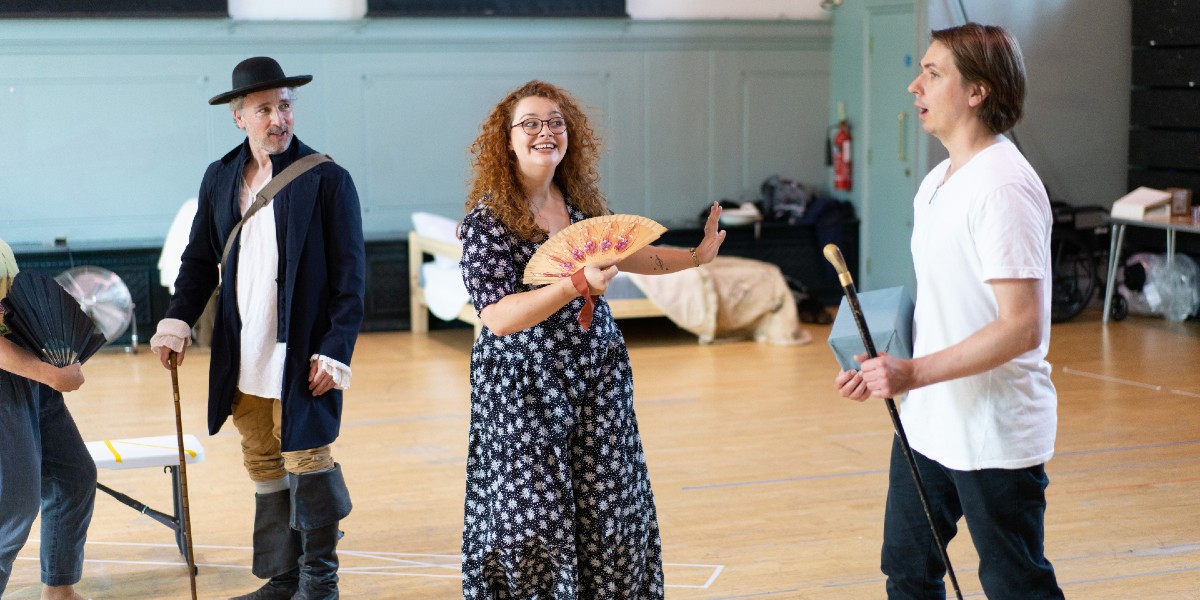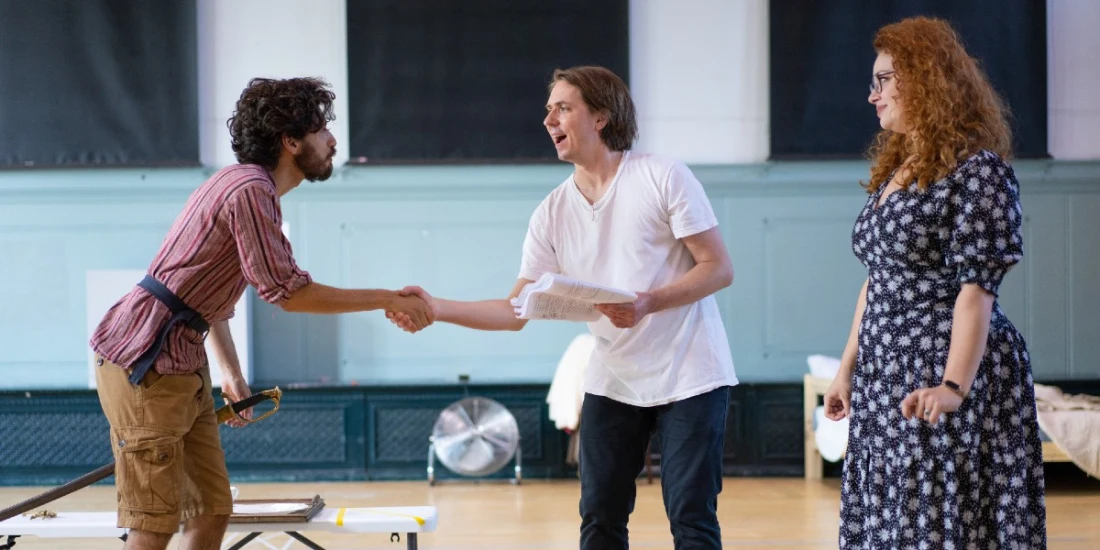Carrie Hope Fletcher and Joe Thomas on the importance of cast chemistry in 'The Crown Jewels'
Carrie Hope Fletcher and Joe Thomas star alongside Al Murray, Mel Giedroyc, and Neil Morrissey about a real-life attempt to steal the King's Crown Jewels in 1671.
Musical star Carrie Hope Fletcher and screen actor Joe Thomas are both trying something brand new by performing in The Crown Jewels, playing at London's Garrick Theatre from 7 July.
“I’ve never done a comedy before,” said Fletcher. “I’ve had roles that are a little bit funny and had a couple of funny lines, but nothing where on the poster says it's a comedy."
This is new territory for the West End phenomenon, who’s played the title roles in productions including Heathers and Les Miserables. Her co-star Thomas, best-known for television comedies like The Inbetweeners and Fresh Meat, is no stranger to making an audience laugh — but that’s not to say he doesn’t feel slightly out of his comfort zone in The Crown Jewels.
London Theatre spoke to the pair about their roles in the regal event, ahead of the The Crown Jewels premiere on 7 July at the Garrick Theatre on the West End.
Tickets to The Crown Jewels in the West End are available on London Theatre. Book The Crown Jewels tickets today.
Carrie, with you primarily starring in musicals and you, Joe, in television, how does this compare to your past work?
Fletcher: Well, I’ve never done anything like this before. You can’t get away with not being funny, but being in the show with lovely Joe, Mel, Al, Neil, and Aidan, who are all actual comedic actors, and who are incredibly funny when they're not on stage. Like, they're funny off stage as well as on stage. I feel like I'm having a little masterclass every day and sort of learning from the best.
Thomas: TV is all about switching on your focus for these very short bursts, which is a challenge in and of itself and quite a counterintuitive skill. And you almost forget how to do longer bursts of focus. The play I did a few years ago, it was almost like I was regrowing that ability to actually just focus for two hours. And I think, hopefully, that built a bit of sinew and muscle and some nerve connections. So now it's not such a shock to the system, but it's definitely a challenge.
I've got a lot of admiration for people who do musical theatre because they're really doing three things. They're singing, dancing, and acting, whereas I'm used to just doing one. So it's a lot … it's a challenge. It's a very involved, quite high-energy show. It's quite tiring; it's great. It's also really fun. And you do finish feeling very energised.

Can you talk about how the cast works together to navigate the show's challenges?
Fletcher: It feels like a nice sort of hybrid because there are songs, and I'm not the only one singing. At the end, we all come together and do this one sort of big number. And that's where I feel like suddenly my confidence grows a little bit in the room. I suddenly take on the role of honorary dance captain.
Thomas: We are constantly being like, Carrie, can I just check the steps?
Fletcher: But then equally, I'm like, Mel, how do I say this line? Give me some of your comedic wisdom. Just being in a room and hearing how everyone says their lines, even those little half-beats where they don't say anything, is amazing to watch.
How important is it to be able to bounce off the cast and creative team during rehearsals?
Thomas: That is a really good way of putting it. And we're all learning, and it's also an evolving process. [Playwright] Simon Nye is there every day, and I think it’s a real positive having the writer there because it means that jokes are constantly being added, and it never gets stale.
Fletcher: That's the wonderful thing about not just theatre, but this team as well, is that there's not an ego in the room. It's all about learning, growing, changing, adapting, and reacting. The rehearsal process is all about making all those mistakes and having that time to trial and error and having all the screw-ups and the mishaps to end up with something that's hopefully wonderful.
Thomas: It's because you just want the show to be good — it doesn't matter how good you are individually if the rest of it doesn't work. And I would so much rather be the worst thing in a brilliant show than the best thing in a terrible show. So you're completely invested in the team. There are things that only the group can achieve, like the pacing of the lines and the comedy beats, which is something that Sean [Foley], the director, talks about quite a lot. That is something that only exists between people.
TV and theatre are different in lots of ways. You can often feel quite isolated when you do television because when you're working, you're completely on your own. The person delivering your line to you might not even be there. Or they might be an X on the camera because that's the eye line. You're very alone, and you're never alone on stage. It's a process that I'm, on a personal level, really benefiting from as well.

The whole cast has bonded on such a strong level. Is cast chemistry essential to the making of good theatre?
Fletcher: There are 12 of us in the whole cast, and I think we are so lucky. Because when you have a big cast, you tend to have little groups of people that just naturally tend to hang out with more. But we've got a little group; we all go out to lunch every day to the same place next door.
Thomas: I think chemistry is important, particularly with comedy. Comedy is a lot about not being afraid to try things. And I think that it's about trust and not being worried about embarrassing yourself. So much of it is to do with that. And that is, frankly, a lot to do with people being nice; it's a very undervalued quality. But if people are nice, then you can get results that just wouldn't be available to the group if people don't get on. A group that doesn't get on won't really generate much.
Fletcher: But it's about having that safe space to go: “wouldn't it be funny if...", and then fully expecting someone to turn around and say no, absolutely not. Usually, someone says an absolute gem, and everyone just laughs so much that it has to be added in.
Thomas: So many of the good moments in a play end up being the third or fourth iteration of a little moment that started off as nothing. Then you build another layer on top of it, and then you build another layer on top of that, and then it becomes something.
Book The Crown Jewels tickets on London Theatre.
Originally published on

